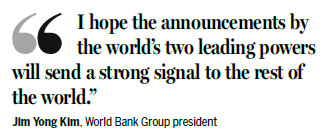

China has fully integrated addressing climate change into the country's overall strategy of economic and social development, President Xi Jinping said on Sunday during a working luncheon on climate change in New York.
China is willing to continue to take on responsibilities that match its national conditions, and the country regards coping with climate change as a major opportunity for transforming its pattern of development, said Xi.
The luncheon was hosted by UN Secretary-General Ban Ki-moon to discuss climate change with leaders from around 30 countries.
Xi said that the Paris agreement will allow the international community to seek a direction for green, low-carbon development. The climate talks should abide by the principle of "common but differentiated responsibilities", which means that countries with different economic, social and historical backgrounds should contribute according to their differences.
Developed countries should fulfill a commitment to provide $100 billion in climate finance annually by 2020 and transfer climate friendly technologies to developing countries, he said.
Ban said at a news briefing after the luncheon that the discussion was "fruitful" and that leaders "expressed their resolve to finalize a durable, meaningful agreement in Paris that applies to all countries".
Ban said that a Paris agreement and the 2030 sustainable development agenda are mutually supportive and "indispensable" for a transition to a low-emission climate.

Wael Hmaidan, director of Climate Action Network, said the UN secretary-general's climate luncheon, and the US-China announcement last week, has made it increasingly clear that world leaders are starting to agree on action on climate change and decarbonizing the economy.
China said it will make available 20 billion yuan ($3.1 billion) to establish the South-South Cooperation Fund on Climate Change, to support other developing countries coping with climate change, while the US reaffirmed its $3 billion pledge to the Green Climate Fund.
China also announced the establishment of a national carbon emission trading system in 2017, which will cover power generation, steel, cement and other key industrial sectors.
Jim Yong Kim, World Bank Group president, said China's move to put a price on carbon will create the largest carbon market in the world, sending an unmistakable sign to business around the world and to other countries, regions and cities.
"I hope the announcements by the world's two leading powers will send a strong signal to the rest of the world, paving the way for a truly ambitious deal on climate change in Paris later this year," said Kim.
Contact the writers through lanlan@chinadaily.com.cn